Many horrific catastrophes have rocked the world and shaped history forever. However, some of these events were apparently worse than initially perceived.
A Reddit question recently went viral: “What event in history is grislier or grosser than we think?” Commenters unearthed these tragedies with some extra information that many likely didn’t know until then.
Someone talked about how horrific medicine was before anesthetics and painkillers. Another individual who claimed to have been on the scene painted a picture of the atrocities in the aftermath of Hurricane Katrina.
This list is quite dark, but it provides insight into the harsh realities of these historic mishaps. Scroll through this somber trip down memory lane.
#1
The Irish Famine. It was actually a genocide and gets downplayed quite frequently as a result of a potato blight but it was more than that. The British shipped out any and every morsel of food available and the Irish were left with nothing to eat. Forced to eat grass or whatever was available and others (millions) fled across the sea to America.
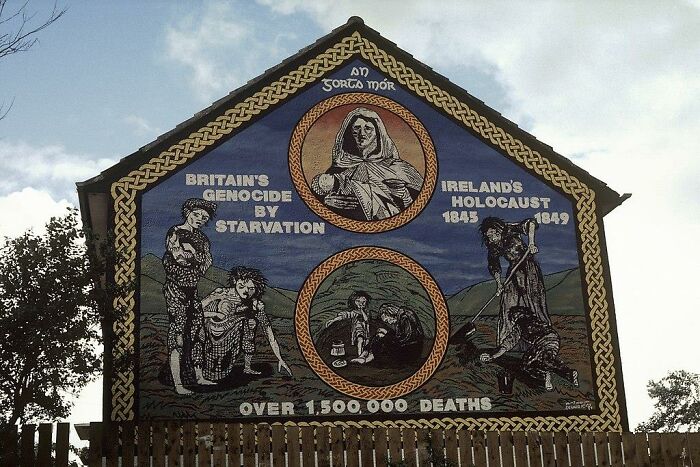
Image credits: PM_YOUR_SINS
#2
I'd argue many people don't know about the Holodomor. Hell, I didn't until I started learning about it after Russia invaded Ukraine in 2022. I'm not a major history buff and I'm on the (literal) opposite side of the planet, which is probably why I didn't know about it, but still... Death toll estimated between 3.5-7 million (some estimates as high as 11) with most settling around the 3.9 million mark. That's the number of Ukrainian people who died in the Holodomor. It was a man-made famine in 1930-1933. Genocide carried out by Stalin on the Ukrainian people.
#3
The atrocities carried out by the Imperial Army before and during WW2. Truly horrific, inhumane s**t.
Yes, Americans, the Russians, and the British did some ghoulish s**t, but Japan’s Imperial Army did next level cruelty.
The Imperial Japanese Army (IJA) and the Imperial Japanese Navy (IJN) were responsible for a multitude of war crimes leading to millions of deaths. War crimes ranged from sexual slavery and massacres to human experimentation, torture, starvation, and forced labor, all either directly committed or condoned by the Japanese military and government.
Evidence of these crimes, including oral testimonies and written records such as diaries and war journals, has been provided by Japanese veterans.
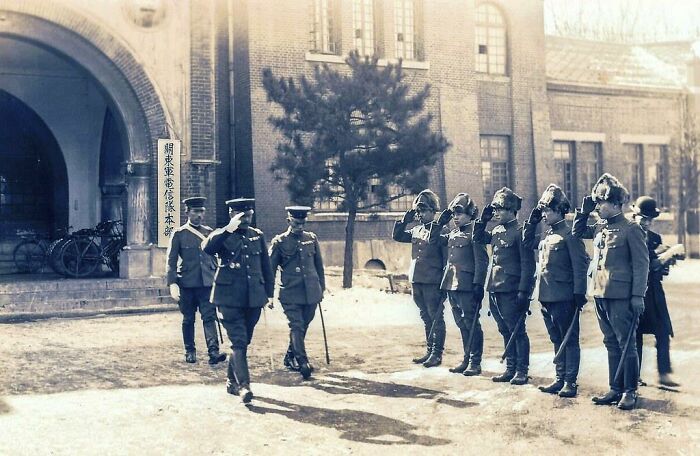
Image credits: Altruistic_Seat_6644
#4
The Belgians' treatment of the people of the Congo during King Leopold's reign.
If a parent worker didn't meet their quota, it was common practice to cut off the hand or foot of one of their children.
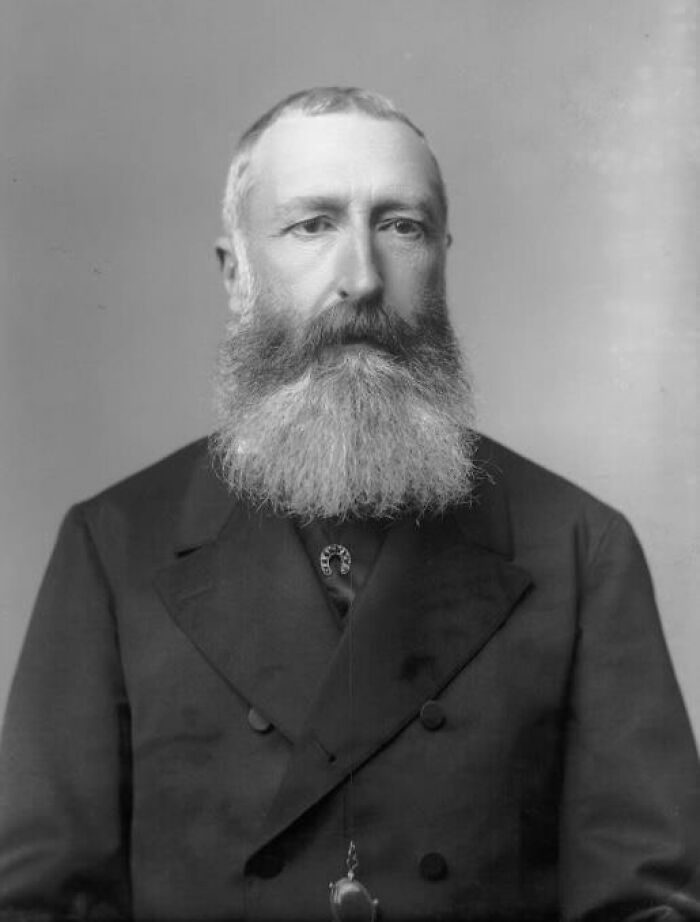
Image credits: RonNumber
#5
The Trail of Tears.
Zapkin:
I live in Memphis, and there are signs around that say ‘Path of the Historic Trail of Tears.’ As a kid, I didn’t think much of it, but now I can’t help but think about how those people were going through one of the worst things imaginable, carrying what little they had, with hundreds of miles to go—and now I drive on that path to get to Target. We really don’t do enough educating on the topic here in the states.
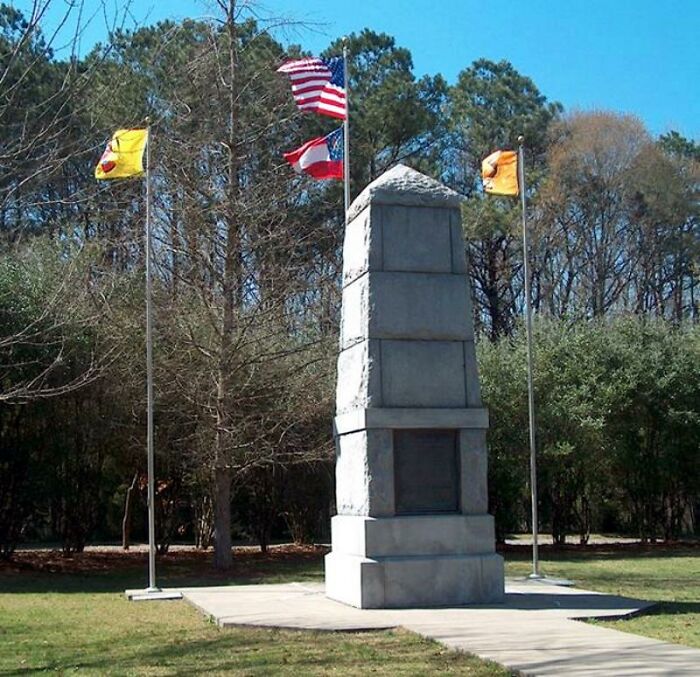
Image credits: HippoSame8477
#6
The Armenian genocide. Turkish military would march Armenians to Syria, and put them in fenced sections of desert with no food, water, or shelter. The only way to get mercy was to try to break out, because they would shoot you and that's quicker.
#7
Unit 731. The majority of what we know about hypothermia comes from the cruelty of Japanese scientist to POWs at this place during WW2.
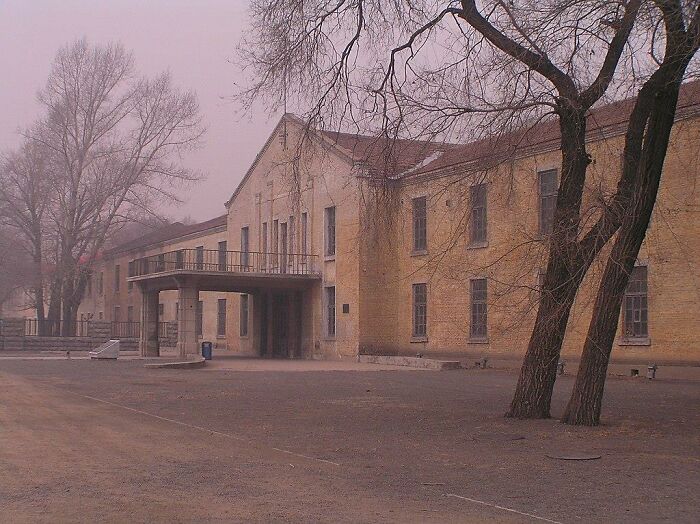
Image credits: Poultry_Master123
#8
The sinking of the Britannic. Though she sunk with significantly fewer casualties than her sister ship Titanic, many of the deaths were due to the fact that the lifeboats were prematurely launched while the ship was still moving, which resulted in some of the lifeboats being sucked into the propellers, instantly obliterating the passengers on them.
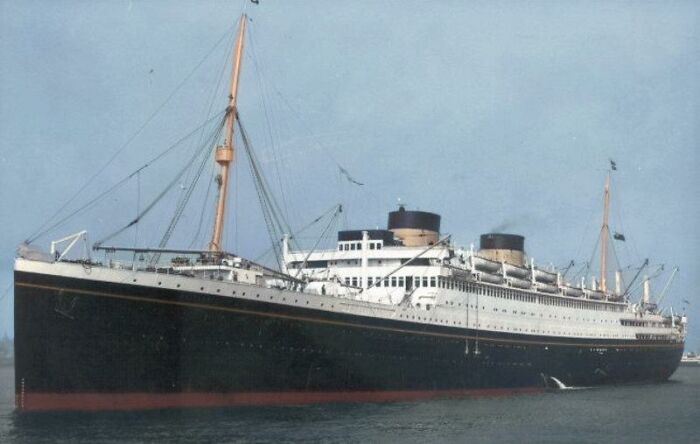
Image credits: Tarkus_Edge
#9
The American Civil War in general. Old school war tactics meeting modern warfare sprinkled with pre germ theory medicine practices resulted in quite the s**t show.
#10
Syphilis.
When it first hit Europe it was nothing like the disease we know now.
It was fast-acting and MADE PEOPLE'S FACES ROT OFF (yes I do believe there are woodcuts of this).
As you might imagine, this was a bad transmission strategy long term for syphilis, so it eventually evolved into the decades-long misery we know today.

Image credits: Creme_Bru-Doggs
#11
The Donner Party. Children choosing who dies to suck the marrow from the bones of their parents.
Randomizing flesh so that parents wouldn't know that they were eating their own children.
It was nuts.
wookiee42:
Yeah, just radomly ran into a mention of the Donner Party the other day and read the wikipedia. I thought it was a wagon train got stuck in the mountains and they eventually were forced to eat each other.
They survived for way longer than I thought and wayyyy more crazy stuff happened
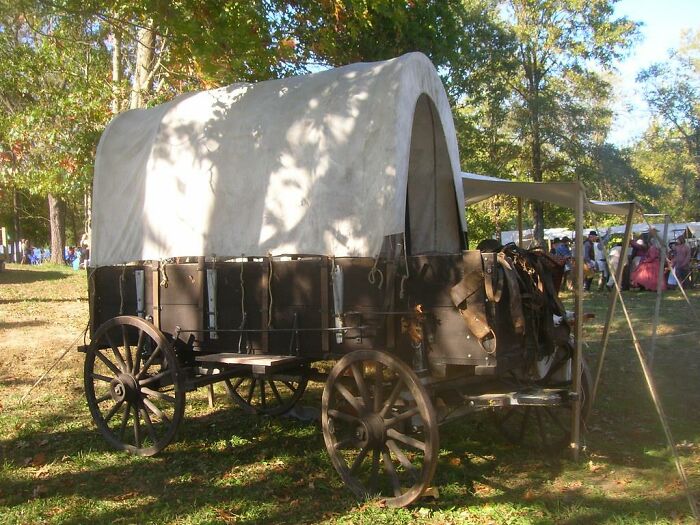
Image credits: Ziggysan
#12
New London, TX school explosion.
"The force of the explosion was so great that a two-ton concrete block was thrown clear off the building and crushed a 1936 Chevrolet parked 200 feet away."
Why does the gas company add that odd smell to the natural gas supply???? Holy c**p!!! THIS is why.
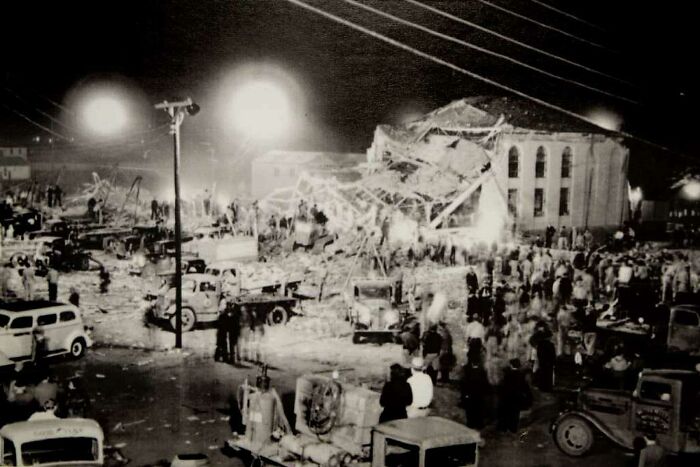
Image credits: GloveBatBall
#13
Not really history, as both are still relevant, but they are a lot less so these days:
Ebola and rabies. What they do to a person is nightmare fuel.
hamburgersocks:
Rabies k*lls you by making your muscles spasm so hard you break your own back... if the hydrophobia doesn't dehydrate you first.
Still no cure if it's caught too late. Don't get bit, folks.
rricenator:
The stories of Ebola remind me of Poe, The Masque of the Red Death.

Image credits: Marxbrosburner
#14
All of Ghengis Khan invasions.
From memory, theirs the capturing and then skinning and then using fat as incendiary to launch and burn the enemies forts down.
Another one where they dug a huge hole and put the prisoners of war in this hole, then put a board on top and continued to use it as a bridge/road until they all died.
There are more but listening to Dan Carlin episodes covering it are epic.
#15
The sinking of the SS Princess Alice
The ship sank in September 1878 in the River Thames 4 minutes after colliding with another ship. Around 600-700 passengers are thought to have died and a diver reported seeing masses of bodies jammed together still standing upright in the doorways.
What made this sinking particularly horrible was that the ship sank in an area where 75 million gallons of raw sewage had been released into the river an hour earlier. The water was also polluted by untreated waste coming from nearby chemical factories.
A chemist described the water as being “Two continuous columns of decomposed fermenting sewage, hissing like soda water with baneful gases, so black that the water is stained for miles and discharging a corrupt charnel-house odour”
16 passengers who had been rescued subsequently died within 2 weeks after accidentally ingesting the water. Many of the passengers couldn’t swim and were dragged under by the weight of their heavy woollen clothing.
Bodies that were recovered were covered in slime that was difficult to clean off and the corpses rotted extremely fast due to the polluted river water.
Drowning is awful enough but drowning in a river of raw sewage is a whole other level of horrible….
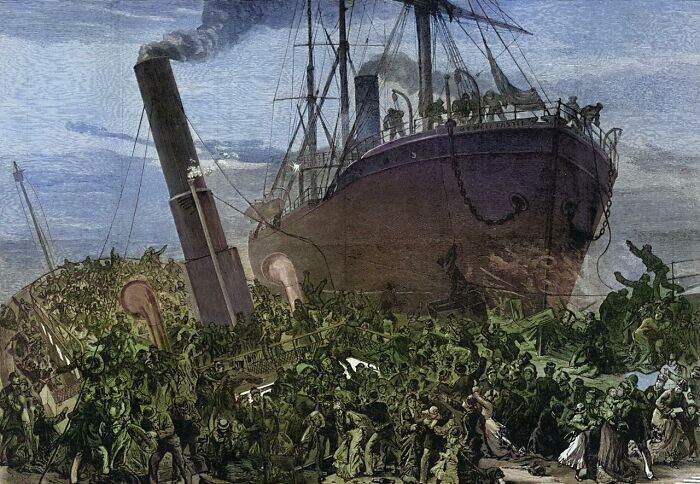
Image credits: queyikes
#16
So grizzly and gross is this:
The bubonic plague, often referred to as the Black Death, is one of the most infamous pandemics in history. It ravaged Europe, Asia, and North Africa during the 14th century, peaking between 1347 and 1351. The plague was caused by the bacterium Yersinia pestis, which was typically spread by fleas that lived on rats. The pandemic k*lled an estimated 75 to 200 million people, wiping out between 30-60% of Europe’s population.
The disease manifested in three forms: bubonic (affecting the lymph nodes), septicemic (infecting the bloodstream), and pneumonic (infecting the lungs). The bubonic form was characterized by painful, swollen lymph nodes (called buboes), fever, and skin turning black due to gangrene, giving rise to the name “Black Death.”
This pandemic had profound social, economic, and cultural effects. Labor shortages following the mass deaths led to significant social upheavals, including changes in feudalism, a rise in wages, and a shift in land ownership patterns. It also triggered a wave of religious movements and scapegoating, with many minorities, especially Jews, being wrongly blamed for the plague.
Smaller outbreaks of the plague have occurred since then, but none reached the same devastating scale as the 14th-century pandemic. Modern medicine, particularly antibiotics, can now treat plague infections effectively if caught early.
Imagine the smell alone.

Image credits: Isaandog
#17
Before we had anesthetic and abundant pain k*llers, field surgery wells absolutely horrific. Here's a bottle of alcohol, we're going to saw your leg off now.
Also, most people doing the work were far from qualified to do the work, they were just slightly better than the next guy in the platoon. I remember reading a first person account of a Civil War nurse who was tasked with curing pneumonia by removing the fluid from a man's lungs. She was given explicit direction based on "I guess this is how the body works". The process was to heat up the rim of a metal rimmed shot glass, sear his chest, and pop the resulting blister, thus removing the water from his body. This was done twice an hour. He died 3 days into the removal, likely a combination of dehydration and infection.
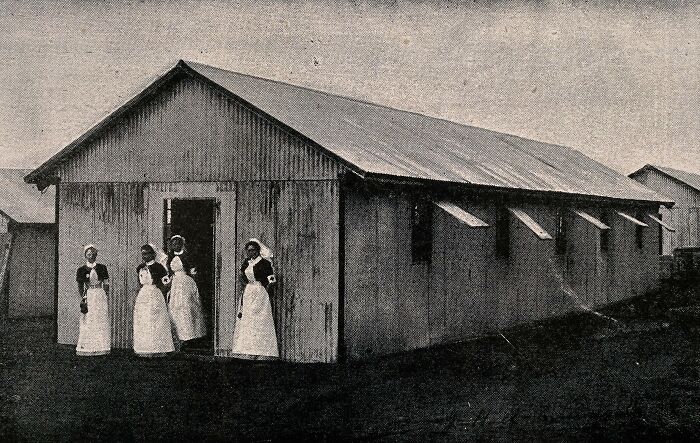
Image credits: Atomic_ad
#18
Reading about the Sand Creek massacre in Bury My Heart at Wounded Knee forever changed my perspective on the American West. The details are absolutely horrific especially what happened to the children.
#19
The Great Stink of 1858 in London. The River Thames was so polluted with untreated human waste and industrial runoff that the city was overwhelmed by a horrific stench during a heatwave. It was so bad that Parliament had to be suspended, and the situation was considered a public health crisis. It wasn’t just gross, it contributed to outbreaks of cholera and other diseases.
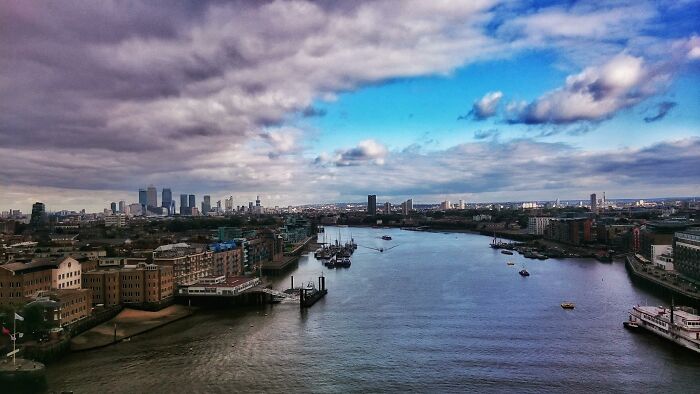
Image credits: LonelyWanderess
#20
The Eastern Front of WW2. It was basically free reign to do any horrific thing they could come up with. I took a WW2 history class. The Holocaust as a whole was unprecedented in its horror. But the "Holocaust by Bullets" and the way they developed mobile gassing units as a precursor to the mass gas chambers was insane.
All the while the occupying forces were r*ping, pillaging, m*rdering, torturing, starving and basically enslaving people. Racially acceptable Women often made arrangements with n*zis to serve as their private girlfriends for food and protection from the other n*zis. Brothels with racially acceptable women were so overrun that the n*zis developed mobile and mass testing centers for syphilis I believe. They required soldiers get tested regularly and promoted it as part of being a good aryan soldier. Of course all the other STDS were there as well. The women were forced in a lot of cases. Keep in mind these guys were piling up bodies like sardines as they're r*ping and torturing. Truly the apocalypse.
#21
WWII in Croatia. Ustashe commited crimes so gruesome that even the N*zis were shocked.
#22
Arab slave trade, they had the custom of castrating male slaves, about 60% of boys bled to death during this process. Mostly due to eunichs selling for more.
Like, slavery is bad enough, do you need to castrate them as well?!
#23
Look up the cannabilism during Stalingrad.
westwebwarlord:
Most people don’t talk about cannibalism during sieges. It starts with house pets when food runs out and leads to picking at your dead friends. War is hell.
#24
Great question. I loved the first season of The Terror about the mystery of HMS Erebus and HMS Terror that disappeared seeking the northwest passage through the arctic. Recently there was an article that attributed the disappearances to cannibalism.
#25
The aftermath of Katrina in and around New Orleans. I was down there twice immediately after the storm and the stench from dead bodies was almost overwhelming.
My sister and BIL bought a house on the other side of lake pontchartrain a few months later and there were STILL bodies floating up on the north shore of the lake.
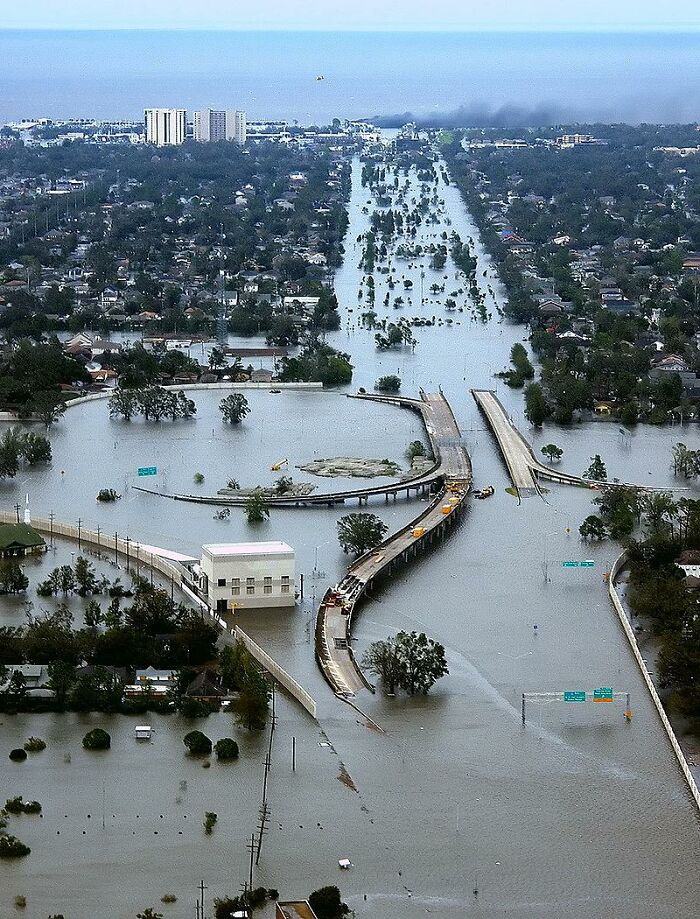
Image credits: thetruckboy
#26
I had always read about how Jack the Ripper mutilated his victims but it wasn't until I saw the photo of one them and realised how f****d up it actually was.
#27
Honestly, I recently spent some time learning more details about the September 11th attacks than I had learned from the news as a kid. This might not be uncommon knowledge, and maybe even a “yeah duh” from most people, but I don’t think I had ever realized the amount of human body parts that littered the streets around the towers.
There was a moment when first responders realized the periodic bangs they were hearing were jumpers hitting the ground. Eye witnesses said the bodies would explode into pink mist upon contact, and one fire fighter was even k*lled by a falling body. First responders were begging people to stop jumping, that they were coming to save them… not realizing that they wouldn’t be able to reach them, and that the buildings would soon collapse.
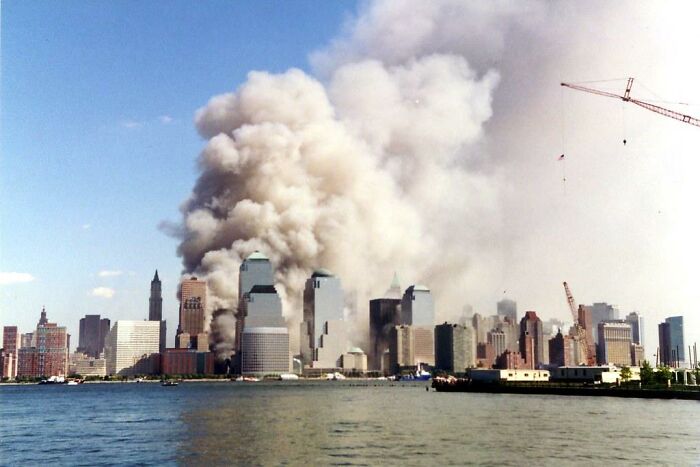
Image credits: FourWhiteBars
#28
Great Chinese Famine (1959-1961) - With 15 to 45 million people dead - kicked off by Great Leap Forward. Mao ignored technical experts and economic principles and established agricultural collectives, relying on peasants to figure out industrialization. The government tried to cover up conditions, which only made things worse.
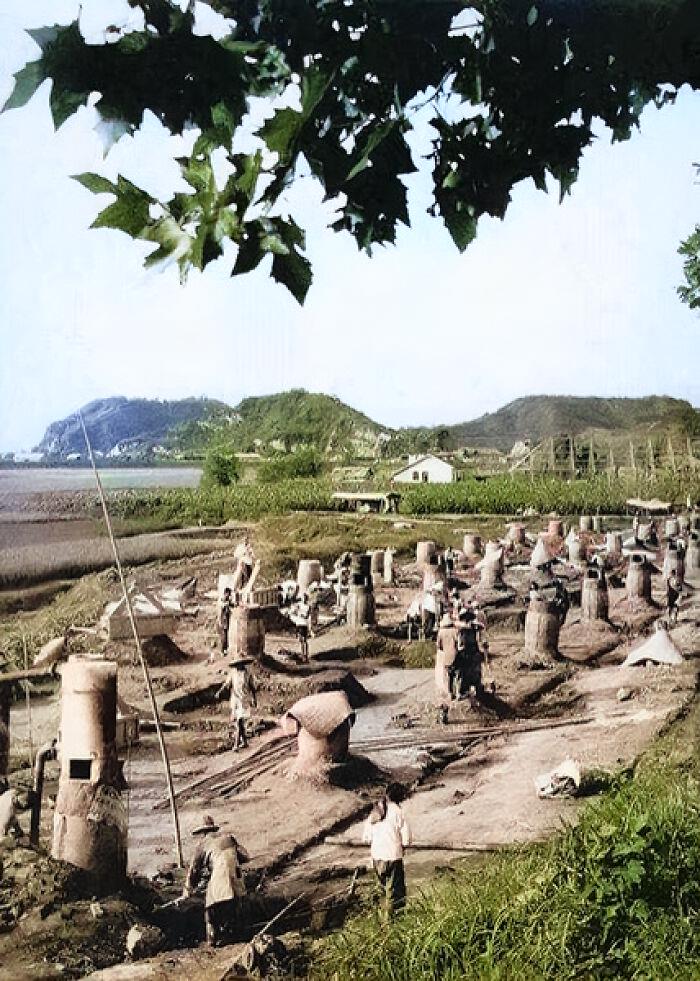
Image credits: sjcjeremy
#29
Basically anytime in history a city was sieged. Go ahead. Pick one.
Sieging a city is a f*****g SLOG for anyone involved. One hand, you have to chill outside of a castle for a loooong time in s**t conditions while making sure your troops are (barely) fed and (terribly) paid. Meanwhile the enemy is taking potshots at you and engaging in sorties and skirmishes to whittle you down. You're gonna lose some homies. Them's the shakes. Be it from battle, hunger, exhaustion, or most likely disease.
Another hand, you have the besieged in question. You're surrounded by enemies, you have a *very* finite and rapidly dwindling stock of food, and help could be a day or a year away for all you know. If it's coming at all. And god forbid, if the enemy breaks into your city...
Which means those tired, pissed off, and bitter soldiers are going to finally let loose. Word of advice: Don't be a woman or a girl if this happens.
So yeah, sieges suck a*s. There's a reason Sun Tzu said to avoid them at all costs.
#30
Pretty much the entire Vietnam war. Open pits of burning bodies, and people being blown apart and impaled everywhere.
#31
The French Revolution. For some context, the “good guys” who just wanted democracy k*lled Marie Antoinette’s best friend and put her head on a pike and paraded it around her window. They locked up the whole family for four years before doing anything with them, while the city was destroyed around them. They had daily executions of elites in the literal street.
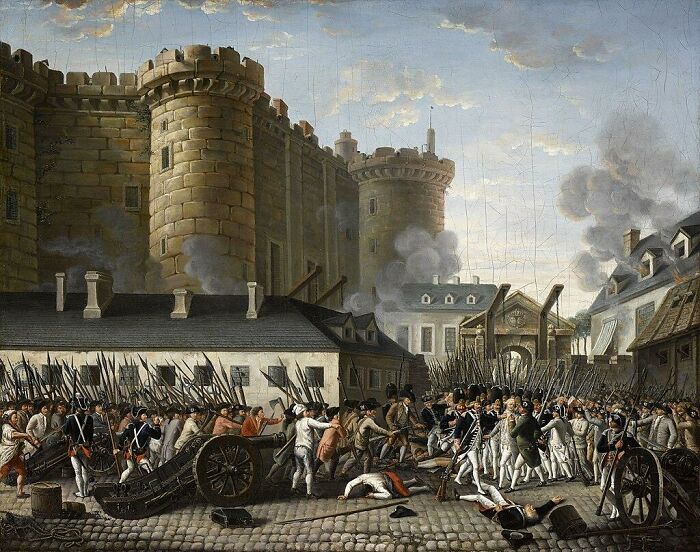
Image credits: Next_Distribution409
#32
Helene hitting NC. There’s still people/bodies unaccounted for, locations yet to be fully observed. Places, people, communities buried under tons of mud, debris…hell, buried under each other.
#33
The sand creek massacre and the following battle. In the massacre, the colonists k*lled women and children, up to ripping unborn babies out of their mothers and tearing ovaries from women to wear proudly on their persons. A horrifying event that should never have occurred.
In the following battle, the natives took revenge by grabbing the colonists by THEIR genitalia and twisting and jerking them around until said member came free from their body. Needless to say, war is gruesome and you should never mess with your enemies families lest you find yourself bleeding out of a delicate place.
#34
Jeffrey Dahmer's apartment had wayyyyy worse s**t than what the Evan Peters Netflix show portrayed.
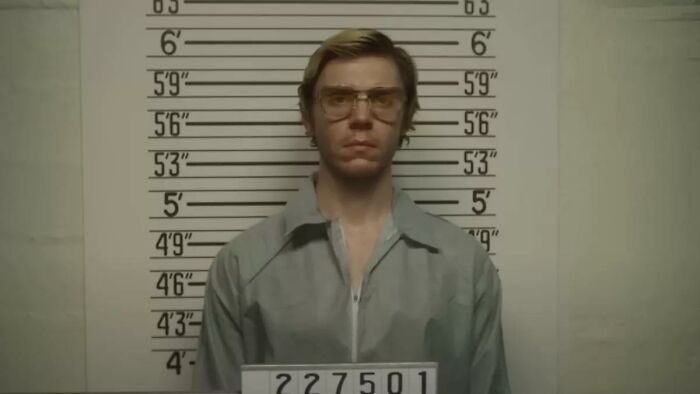
Image credits: AddictedToDurags
#35
1986 Challenger space shuttle explosion:
We are certain that the crew capsule part of the shuttle survived the explosion intact, and that the astronauts on board were alive for most or all of the following:
The crew capsule continued upward on a ballistic trajectory after the shuttle disintegrated, then plummeted toward the ocean at terminal velocity and anyone who is still alive died from the sudden deceleration (splat) when they hit the surface of the ocean, which is basically like hitting concrete when you're going that fast.
>The crew cabin tore loose at 45,000 feet, arced upward to about 65,000 feet, and then began a 2-minute, 45-second plunge to the Atlantic Ocean.
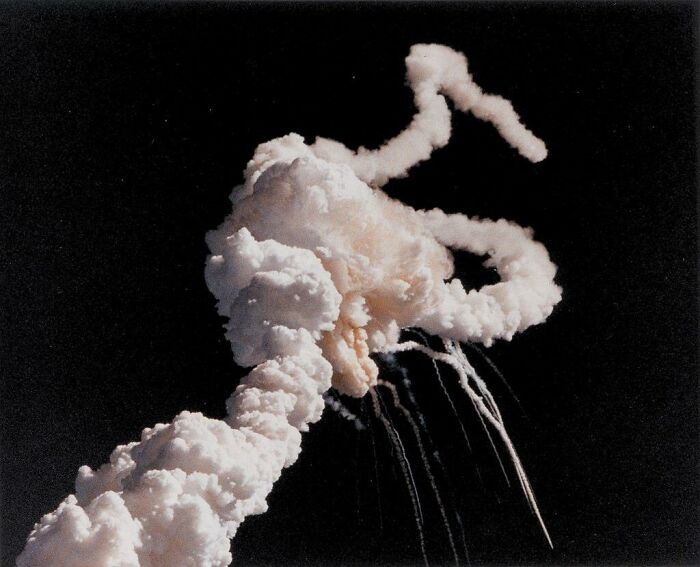
Image credits: lannister80
#36
The scene after Travis the chimp mauled the lady in CT.
mibonitaconejito:
Omg yes. The audio was so disturbing it gave me nightmares but the scene afterward was....?
Specialist-Funny-926:
I'm pretty sure one of the police officers that responded to the incident had to resign afterwards due to PTSD. I think it was one of the officers that shot Travis. To my knowledge, Travis charged the officer, the officer shot Travis, Travis kept coming at the officer and ripped the door off the patrol vehicle, the officer then shot Travis again.
#37
The Death chambers in Germany. I lived in Germany for a few years. You know how we all heard of the nazi's gassing Jews. I took a tour to one of these places. As I got of the bus I was assaulted my whole body tightened up goose bumps appeared my brain was screaming evil walks here. I did not go in. I sat on the bus and cried to myself.
#38
George Washington's death.
The Dollop has a great episode on it.
Dude got drained of blood.. stuck in the snow like a popsicle.. then (almost) refilled with sheep blood in attempt to bring him back to life.
#39
Pickton farm.
#40
The way that the Chernobyl TV show presents the effects of acute radiation poisoning is probably the most accurate representation in media. However, there have been much worse cases of radiation exposure.
The largest radiation dose ever received in a single event was by Hiroshi Ouchi who in critically accident was splashed with liquid uranium fuel and received an estimated dose of 17 Sv. To put this into perspective, the lethal dose is 5 Sv. He was kept alive for 83 days to study the effects of extreme radiation on the body despite him begging medical staff to let him die!
Look it up at your own peril! Some of the details are incredibly gruesome!
#41
The John Wayne Gacy case. There are many things that point towards Gacy not only having accomplices, but likely being involved in a piece of the same snuff film ring that Dean Corll participated in. While the official account of the case states that Gacy acted alone, there is at least one m*rder where Gacy is confirmed to have been out of town at the time, and several more where Gacy claimed to have been out of town, but did not have any reliable sources for authorities to verify that.
#42
The mutiny on the HMS Bounty.
Although Captain Bligh survived by navigating his life boat 4,000 miles to Indonesia, it is the mutinous crew that suffered most.
They settled on the un-inhabited Pitcairn islands, which is basically located in the swirling eye of the Pacific storm systems. Most died from fighting one another. The island is inhabited by their descendants today, with two main families that dont talk to each other due to some long running feud. It is supplied 4 times a year by boat from New Zealand.
Due to rampant sexual ab*se of minors, when they attempted to attract new residents at one point, they had to stipulate no families with kids would be accepted onto the island.
#43
Tulsa Race Massacre.
#44
To wrestle control from the Colhuan king the Mayan leadership first built a grand temple to their god Xipe Totec and offered the extremely honored standard priestess role to the kings daughter. To celebrate the completion of the temple the Mayans hosted the king for a great event and feast. After feasting the Mayans guided their host to go visit his daughter at the alter, but when they got there I can only imagine the pure horror the king felt seeing his still barely living daughter strung up above her recently removed skin as presentations to their god. They then sacrificed his son in front of of him and yea f*****g brutal lmk.
#45
Sylvia Likens. Because how could I be a human and share a species with such monsters.
kimberequinox:
This case haunts me to this day. That poor girl..
#46
1996 Mt. Everest Disaster
Complete clusterf*ck all around. Everything that leads up to it should have been a glaring red flag, and people actually accountable are among the dead.
For more:
Into Thin Air by Jon Krakauer - author was a part of the group that summited earlier and barely made it back to camp in the blizzard
Everest (1998, IMAX)
The documentary team was there when it happened and joined the rescue effort
Meanwhile Everest (2015) is a piece of s**t, as it goes out of its way to paint the two men most responsible for all this as heroes.
#47
In 1914, National Guard troops were responding to a Miner strike in Ludlow, Colorado. They set up a machinegun position on a bluff overlooking the miner's camp. At some point a firefight broke out and the guardsmen opened fire on the camp with the machinegun. This kicked off a multiday battle between the miner's and the guardsmen.
During the chaos, women and children fled to cellars underneath the camp for protection. At night fall, the guardsmen soaked the tents in kerosene and set them ablaze. After the fire went out, one cellar revealed there were 11 children and two women that had suffocated and been burned during the fire. A total of 25 people were k*lled in what became known as the Ludlow Massacre.
>*In retaliation for the massacre, miners attacked antiunion town officials, strikebreakers, and the mines, taking control of an area about 50 miles long and 5 miles wide. As many as 50 people died during the reaction to the Ludlow Massacre. Fearing a further escalation of violence, U.S. President Woodrow Wilson sent in federal troops to restore order. Unlike the National Guard, the federal troops were impartial and kept strikebreakers out of the coal mines. The strike ended on December 10, 1914. While the workers got little in the way of tangible benefits from their strike, the UMWA gained 4,000 new members.*
#48
Hollywood.
There's so much we still don't know, it's like trying to explore the entire Ocean.












 English (US) ·
English (US) ·